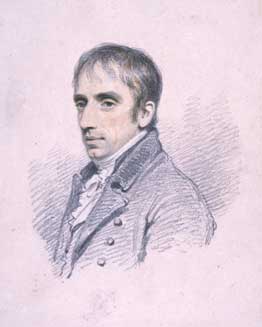
William Wordsworth, by Henry Eldridge, c. 1802. On Wikimedia Commons, public domain.
In Arts One this week we talked about Lyrical Ballads by Wordsworth and Coleridge. Today in class, after talking about “The Rime of the Ancynt Marinere” and Romanticism in general, I asked the students to meet in groups of 3-4 and analyze one of the other poems in the collection. These are their notes!
“Expostulation and Reply” and “The Tables Turned” (Wordsworth)
- These sequential poems from Wordsworth and Coleridge’s Lyrical Ballads both deal with speakers who criticize the solely academic pursuit of knowledge.
- It is clear that the advocation here is for a return to understanding humans, nature, and human nature, through experiencing them for oneself.
- Books can only relay so much; we need to appreciate emotional connections that we make to other things, especially those which are natural.
- These poems relate to the overall theme of Romanticism seamlessly: they favour the importance of self-reflection and contemplation as a part of nature, and relates the importance of the common individual in a society where only scholastic and powerful individuals are valued.
- Nature needs to be revered, and we need to draw fulfillment, inspiration, and knowledge through our own senses.
- Books are, by their very nature, static and unchanging. They can not possibly suffice for a true understanding of our surroundings. These poems criticize those whose only source of information is unchanging — set in ‘stone’.
“The Nightingale” (Coleridge)
Conversational poem written in blank verse
– If Coleridge, separates from his other poems
- More similar to Wordsworth
– Theme of stillness and idleness
- Torpor in the Savage Torpor
– References the poet, why?
– About the sense
- Experiencing vs. just writing about it
- Should be effected by emotion
– Nightingale represents sadness/melancholy
- People who write about sadness have yet to actually learn about sadness
– Nature isn’t sad, man is, and we impose this sadness onto it
– By default nature is lovely, but we choose the ugly
- Moving the souls of people with the wrong intentions (fame)
– Sad man recognizes his sadness in the nightingale’s song (as opposed to himself)
– Imagery of nature is very idealized/romanticized
– Poem keeps going, very immediate (use of dashes as opposed to periods)
– Friends refer to group of nightingales
“Old Man Traveling
Animal tranquility and decay” (Wordsworth)
One group’s notes on this poem:
“A man who does not move with pain” – yet he does. He is decaying according to the subtitle. Perhaps it is his mental state that has decayed? And with that comes his ability to process anguish.
Age could be the ‘decay’ that is mentioned.
Old man is appearing at peace, yet he is actually mournful. Contrast with Lines Written Early Spring, where the rest of nature also appears at peace, but humanity is not.
Old man is exhibiting peace even though this terrible thing has happened. Many people would want to express their anger; his stoic nature singles him out.
Perhaps age is a factor? Just like in Tintern Abbey, with age comes a better understanding and wisdom, perhaps a greater ability to deal with pain?
Other theory for the subtitle – the family is decaying, yet the old man is tranquil despite this.
Second group’s notes on this poem
backward nature; son is dying before the father
father is peaceful? or does he indeed move with pain?
so many contradictions
so patient that he does not need patience
“animal tranquility”
animals do not mourn the same ways humans do
tranquil animal’s attitude towards decay
however, moving with thought rather than pain is not very animalistic
the birds “regard [the father] not” in the same way the father does not overtly express his grief
another backward nature: humans acting like animals (not being sad at death)
commentary on war: son has died in a “sea fight”
perhaps this means that the backward nature of the son dying before the father is a result of war?
“Tinturn Abbey” (Wordsworth)
– the most romantic of all the poems because of the description of the area surrounding Tintern Abbey- repetition of the fact that the area is very secluded
– the description of the scene reflects on the vagrant dwellers and the hermits because they live in such as beautiful place- associate the beauty of the scene with the people living there although this is most likely not to be true.
– when the author discusses the city life he says “often times the still, sad music of humanity” (111) he talks about the people living in the city and when looking at the vagrant dwellers and hermits, you would never associate the sad music of humanity with them
– nature is a prevalent theme- the narrator wishes to return to Tintern abbey, even in his mind
– The beautiful description of Tintern Abbey (and the surrounding area) preceding the mention of the “pastoral farms” (109) takes away from the fact that those dwelled on farms in this era would often be very poor. The beauty of nature at the Abbey takes over any potential misfortune in the lives of those who live there.
– Nature becomes necessary for the narrator to experience serenity and peace. The city does not provide the same haven.
